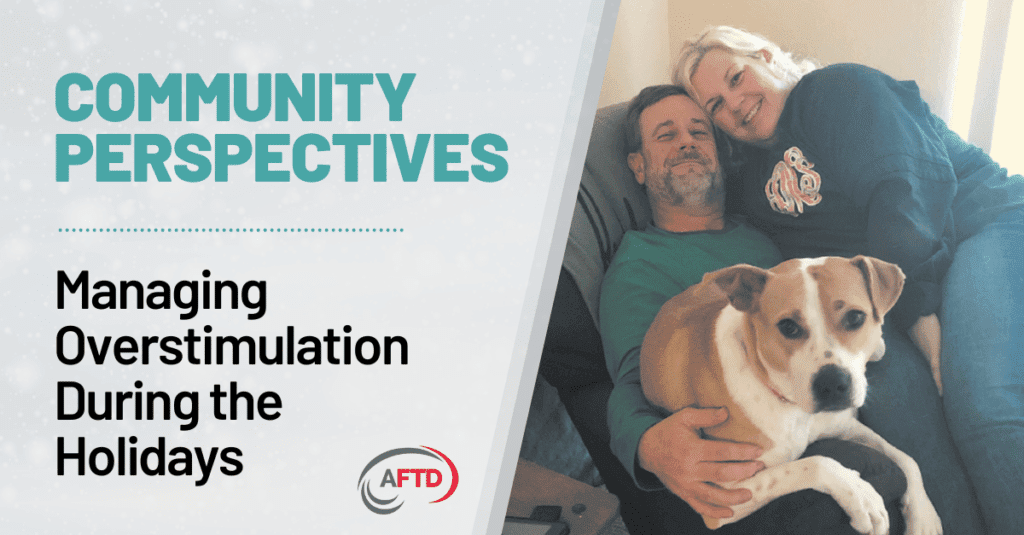Community Perspectives: Managing Overstimulation During the Holidays

While the holiday season’s hectic atmosphere is part of the fun for many families, it often isn’t ideal for people with FTD. The overlapping sights, sounds, and smells of many holiday festivities can be overwhelming, and leave someone with FTD exhausted.
As AFTD learned from Jennifer Lee, a member of AFTD’s Persons with FTD Advisory Council, and her care partner and husband Chris Lee, forgoing large family gatherings and holiday travel can be an opportunity to form new, more casual holiday traditions that make managing overstimulation easier and create more fun for everyone in the family.
Before FTD, Jenn and Chris spent their holidays “making the laps” to visit family members. “Sometimes it was driving to South Carolina and spending a day or two there before turning around to try and see everybody back home,” Chris said.
“We don’t do that anymore,” Jenn added. “The more out of your normal routine it is, going to place after place, the more it affects how you’re able to do other things. Who wants me to go to their house for 30 minutes only to go, ‘Oh my gosh, I can’t take this anymore,’ and leave when everyone else is having a good time?”
Instead, Jenn and Chris have begun to take things more slowly and opt for smaller gatherings with their children and other family members. For Jenn, it is easier to avoid crowded gatherings that can lead to sensory overload.
While it took some time to adjust to a more subdued holiday tradition, Jenn and Chris began to enjoy slowing down and spending more leisure time with their children.
“It’s been kind of fun making new traditions; we never had gingerbread house competitions before!” Jenn said. “We started making new traditions like that because they’re fun and low-key.”
Sometimes, when other family and friends plan large gatherings, Jenn stays home while the others go without her.
“It’s better for me to stay home with our dogs and cat – it doesn’t offend me when people go to other things; that’s just how things are now,” she said.
As a parting piece of advice about the holidays, Jenn said to “keep things simple.
“Things don’t have to be elaborate journeys that everyone thinks we should be on,” she added. “How we’ve always done things isn’t always how we should do them. Being open to change when you have a disease like this is about one of the best things that will get you through. Just having the support of a care partner and a family that loves me has helped me be able to be the person I am now.”
If a person diagnosed with FTD does want to go to holiday events, Jenn suggests making alterations so things are easier. Make a plan before going, including an “escape plan” to leave when festivities become too strenuous. When holding gatherings at home, Chris added that it’s OK to take “timeouts” to recuperate if the celebration gets to be too much.
By Category
Our Newsletters
Stay Informed
Sign up now and stay on top of the latest with our newsletter, event alerts, and more…
